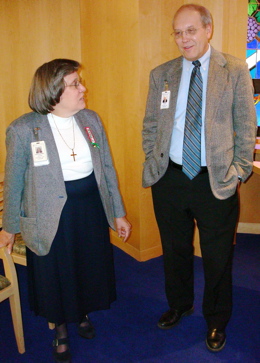“Every time someone would come in, there would be screaming and people throwing themselves on the floor,” the director of pastoral care says. “I remember that I was absolutely drained.”
Then there was the time last year when he performed a marriage ceremony in a hospital room because the grateful bride wanted her dying mother to see the wedding, which initially had been planned for months later. The mother died the next day.
 “You never know what a day holds,” says Jackson, who serves as director of pastoral care. “You never know what you are going to be called on to do. You certainly have many sad, difficult experiences, but there are many times of wonderful celebration.”
“You never know what a day holds,” says Jackson, who serves as director of pastoral care. “You never know what you are going to be called on to do. You certainly have many sad, difficult experiences, but there are many times of wonderful celebration.”
It is little wonder that Jackson, who is retiring December 31 after ministering at the hospital for 30 years, says his job has been an “emotional roller coaster.” Still, he says, “It’s been an incredible blessing.”
Jackson’s time at SCH has been unpredictable from the beginning. He first started working at the hospital as an orderly while putting himself through North Park Theological Seminary. He was planning on becoming a church pastor. “I never dreamed I would go back there (hospital) to work.”
After graduating from the seminary in 1969, Jackson did serve two pastorates in Kansas, but felt called to the chaplaincy. “The sense of vocation has been so strong for me,” he says.
The hospital has become his parish, Jackson says. Although he will see many of the patients and their families only once, he will see numerous others frequently over the course of years. “I enjoy the relationships that are formed,” he says.
Those relationships are built as Jackson has attended to people’s needs. At times that has meant just sitting and listening to someone. He also helps find resources, discusses ethical issues or answers theological questions raised by the patient or family.
The chaplain’s role is not to be an evangelist in the traditional sense, Jackson says. “There is a lot of seed planting; there is not a lot of harvesting.”
As chaplain, Jackson ministers to people of all different faiths, including patients and families who profess no religious belief. “Chaplains are there to be of ministry to people where they are,” he explains. “There is evangelism in the sense that you are with people and they know who you are – that you are a pastor.”
Chaplains, as much as any other minister, have to be able to work in a pluralistic environment. “You have to be mindful of the different traditions – of what is helpful to do and what is not,” Jackson says. That’s a tall order at SCH, which is located in the zip code that the U.S. Census Bureau says is the most ethnically diverse in the country.
Jackson is looking forward to retirement, but looks back at his time at the hospital with gratitude.
“There are so many wonderful times of ministry,” Jackson says, adding that the best was “the feeling that God has prepared the way for you. It’s like you’re supposed to be there.”
Editor’s note: In the accompanying photo, Jackson is pictured with Ruthanne Werner, who has been named to succeed him. Werner joined the chaplaincy team in 1985, which also includes chaplains Jose LaLuz and Stephen Chang.
